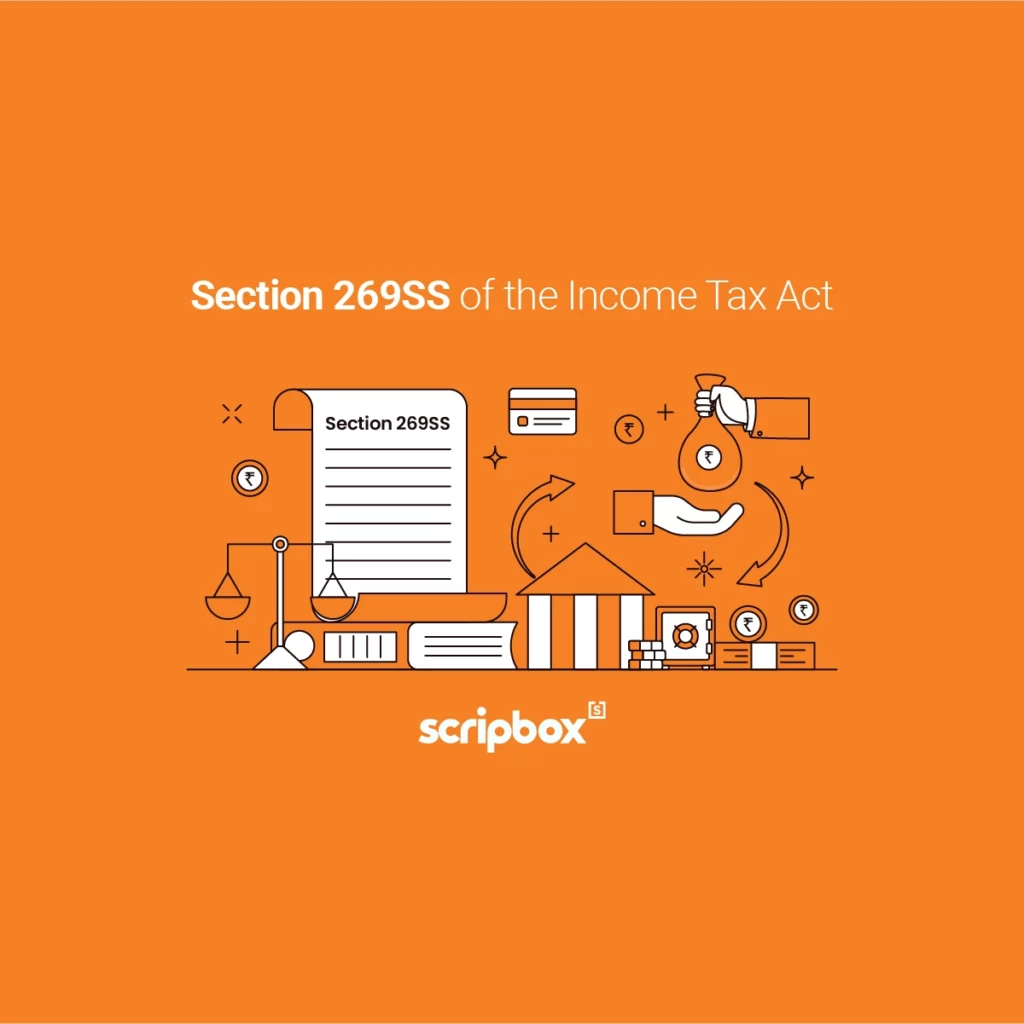Section 269SS of the Income Tax Act is about cash deposits, loan repayment or specific account deposits. It acts like a watchdog for tax evasion using unfair means like cash deposits and concealing deposit information on the face of loan repayment.
Concealing income information or leaving it unexplained from tax authorities is a serious criminal offence. It might attract penalties and even lead to imprisonment. One such way used by taxpayers is unaccounted cash.
The Government of India (GoI) has brought such transactions under the purview of the Income Tax Act with Section 269SS and Section 269T.
Here is a brief explaining the Act and the nitty-gritty associated with it.
What is Sec 269SS of the Income Tax Act?
According to Section 269SS of the Income Tax Act, no individual can accept a deposit or loan or any other ‘specified sum’ of money by any mode other than account payee bank draft, account payee cheque, electronic clearing system, or other specified manner.
The term ‘specified sum’ here means money in any amount received as advance, etc., for the transfer of immovable property, irrespective of whether such transfer takes place or not.
This applies to the following:
- A deposit, loan amount or specified sum of money worth ₹20,000 or more
- A sum of deposit, loan amount or specified sum worth ₹20,000 or more
- Loan, deposit or sum amount received from a depositor, but the loan is not repaid where the unpaid loan amount is ₹20,000 or more.
Therefore, a person cannot accept a deposit, cash or loan deposit or a sum of these worth ₹20,000 or more in a single day.
What is the 269SS limit?
Section 269SS of the Income Tax Act would apply for the deposit, cash or specified sum or a total of all worth ₹20,000 or more. 269SS will also apply if a loan or deposit remains unpaid on the date of an individual receiving such a specified sum. In this case, the outstanding amount should be ₹20,000 or more.
What are Section 269SS exceptions and exemptions?
Section 269SS has certain exemptions and exceptions. Here is a list:
1) Specified sum, loan or deposit is taken or accepted for any amount from the below-specified entities
- The Government of India (GoI)
- Central, State or Provincial Act associated organisations
- Post Office Savings Bank, Cooperative Bank, Banking Organisation
- Companies Act 2013, Section 2, Clause (45) defines companies
- Official Gazette notified bodies, associations or classes of institutions
2) Loan accepted by an individual who only earns agricultural income from another person who also earns agricultural income only
- If the person earns additional income other than agricultural income, in addition to agricultural income, it would be taxable as per the Income Tax Act. Such a person should have no tax liability after the exemptions and deductions.
3) Other exceptional cases that fall under the Act’s purview
- Cash accepted from relatives during emergencies (not for the purpose of tax evasion)
- Cash contribution in a partnership firm from partners
- A mere book entry without any money received
What is the penalty for a 269SS violation?
The penalty for 269SS is 100 per cent of the total loan, specific sum or cash amount accepted. Therefore, a taxpayer must ensure that while receiving such an amount, Section 269SS is complied with.
If the taxpayer proves the purpose with proper reasoning, they might get a waiver for the sec 269SS penalty.
Conclusion
Section 269SS of the Income Tax Act regulates the acceptance of certain deposits, loans or specified sums by individuals that are worth ₹20,000 or more. It encourages digital payments due to their traceability and discourages tax evasion due to unspecified cash transactions.
Frequently Asked Questions
Section 269T of the Income Tax Act regulates specific loan repayments or deposits by individuals, Hindu Undivided Family (HUF) and other entities.
No, because such a transaction would not comply with Section 269T of the Income Tax Act.
Yes, loans from friends and family worth ₹20,000 and above in cash can attract a Section 269SS penalty. As per 269SS, you cannot receive ₹20,000 or above in cash even if its purpose is personal.
Specified modes of payment under Section 269SS of the Income Tax Act are NEFT, RTGS, account payee bank draft or cheque, Electronic Clearing System (ECS) through bank account, net banking, credit card, debit card, IMPS, UPI and BHIM. These modes of payment are detailed in rule 6ABBA.
